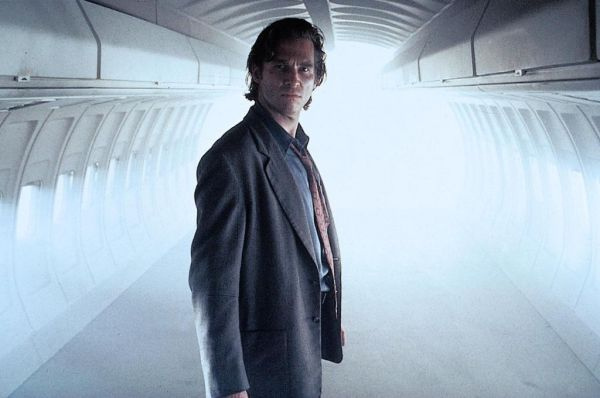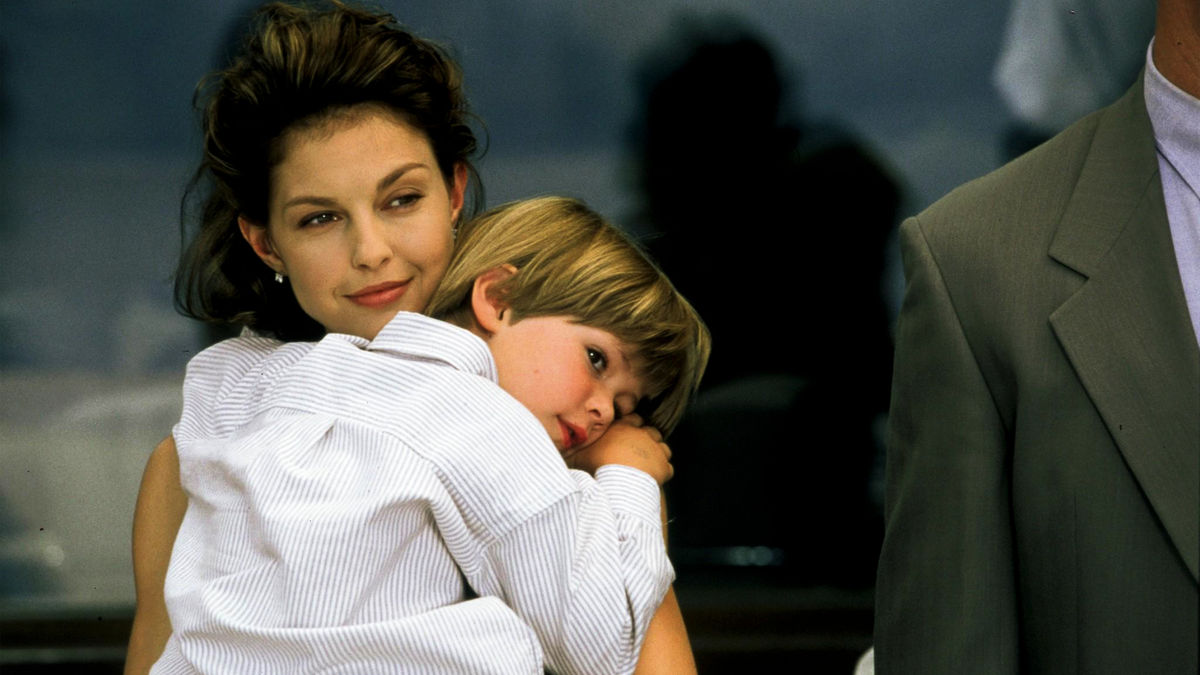6. City of Industry (1997)

Harvey Keitel starred in some of the most daring and controversial movies during his renaissance in the 1990s, and while some of them were hailed as classics and masterpieces, there were plenty more which, though highly entertaining and brilliantly executed, went under the radar. One of these was City of Industry, a wholly satisfying crime drama that transforms itself into a tight revenge thriller in its second half.
It stars Keitel as Roy Egan, a retired criminal who agrees to come back to crime to assist his brother Lee (Timothy Hutton), who is plotting a heist on a jewellery store. Meeting the other men involved in the planned robbery, Roy immediately mistrusts Skip (Stephen Dorff), who is going to drive them away from the crime scene. Once the heist goes well, Roy’s suspicions are proven correct when Skip kills the other crooks in a heartless shoot out while they’re relaxing with some beers. Roy flees, but won’t let Skip get away with what he’s done.
Directed by John Irvin, the film is tightly scripted by Ken Solarz. It moves swiftly and steadily without ever feeling rushed, while there is a gritty, grimy feel to the script that does not feel remotely contrived. The acting is great too, from Dorff’s slimy Skip to Hutton’s sleazy portrayal of Lee. Keitel, though, carries proceedings, giving a brilliant performance free of showiness. It’s Keitel at his reliable best, a sturdy and cool piece of acting which stays true to the tone of the story being told.
With solid support from the likes of Lucy Lui and Famke Janssen, City of Industry was shot on a modest budget of around $8 million, yet failed to make back even a quarter of that at the box office. Long buried in time, it’s a film that is a pleasure to see, whether it eluded you upon release or you are going back in for a revisit.
7. Used People (1992)

Italian movie legend Marcello Mastroianni didn’t make many American films in his lifetime, though when he did decide to go State-side it was usually for a film that warranted his presence. That said, the films he made in America are largely forgotten today, which is certainly a shame when they are as strong as Used People (1992).
Directed by Beeban Kidron, the film paired Marcello with the iconic Shirley MacLaine, resulting in a chemistry that comes bursting off the screen. With a fine script by Todd Graff from his own material The Grandma Plays, it’s a vivid and lively film set in the Queens area of New York, full of eccentric and memorable faces, all played superbly by an eclectic cast of both unknowns and megastars alike.
A film focusing on a close knit community of family and friends, it’s full of charm and subtle humour. Beeban Kidron directs nicely, keeping things simple and direct, while the script is witty and full of life, often feeling close to Woody Allen territory in its tone. The main reason to watch Used People, though, is for the cast. Marcello made his best work in Italy and Europe of course, but it could be claimed perhaps that his part in this undervalued romantic comedy remains his finest English speaking role. He is charm personified, every bit the exotic Italian who arrives to shake up the New York neighbourhood.
Marcello aside, MacLaine is as likeable as ever, while the likes of Jessica Tandy, Joe Pantoliano and Kathy Bates fill out the supporting cast beautifully. Long buried in time, to see this lost gem you will have to seek out the Warner Archive DVD release, but it’s a rare treat well worth the hunt.
8. Twenty Bucks (1993)

Directed by Keva Rosenfield, the premise of Twenty Bucks is simple, but also features a touch of genius. Following the varied adventures of a single twenty dollar bill, the viewer is sent on a tour of the more colourful parts of an unspecified American city, and briefly into the lives of its most colourful inhabitants.
The whole thing begins when a woman gets a 20 out of an ATM, but sees it blow away into the grasp of a homeless woman, played by Linda Hunt. When the bill is stolen from her by a boy, we follow the twenty on to the story of Sam (Brendan Fraser), who is just about to be married. On the night of the rehearsal dinner, he is given the note by his rich father in law. The gift is a symbolic offering of what money can achieve, but he mistakes it for cheapness. Annoyed and deflated, he gives the note to a stripper on his stag night.
This doesn’t go down well. The stripper spends the money at a herbal shop, whose owner (played by Gladys Knight) sends it to her grandson Bobby as a birthday gift. Meanwhile, cheap crook Frank (Steve Buscemi) comes across a sharp suited criminal by the name of Jimmy (Christopher Lloyd), who suggests they get together to act out some organised robberies that night. On a rampage, they stick up numerous gas stations and convenience stores. During one hold up, young Bobby hands Jimmy the note to get him some champagne. Post robbery, he takes the boy his bottle and pockets the twenty.
Hiding in a car park, Jimmy and Frank split their earnings for the night, but have a disagreement over the money. In the end, Jimmy shoots Frank, leaves the car and takes the whole lot. Frank dies with the twenty bucks on him, which then gets taken away by police, taken into lost property, where it continues blowing round the city into the hands of various other folk.
Remarkably, Twenty Bucks was based on a script written in 1935 by Endre Bohem, but was never filmed. Picked up in the 1980s, his son Leslie dusted it off and brought it into the 1990s. That said, it seems odd that this film came from any other time than the 1990s, as it’s such a cool, hip and typically 90s idea that it was born to be made then. Any later, or earlier for that matter, and it wouldn’t have worked so well.
Twenty Bucks received glowing reviews in the press, though unfortunately slipped by the wayside commercially. The film is cultish without being pretentious, and it belongs to its own secret little club, one which the knowing members of can rest assured they know about one of the most overlooked, yet brilliant, little films of the 1990s.
9. Fearless (1993)

For decades now Jeff Bridges has divided his time between indie cinema and more straight forward mainstream fare. Sometimes his more quirky offerings have been unexpected successes, and in the case of The Big Lebowski, nothing short of a cultural phenomenon. In the 1990s he starred in a run of hugely varied pictures, playing the hero in the likes of Blown Away, and the villain in The Vanishing. One of his oddest and most intriguing roles came in Australian director Peter Weir’s overlooked Fearless, a picture which came out in 1993 to little fanfare and speedily disappeared soon after.
Bridges plays Max Klein, a man who survives a horrific plane crash and is never the same again. Most of his fellow passengers died in the blaze, though those who did survive recall Max’s heroism and calm demeanour in the face of annihilation. Becoming something of a celebrity and media sensation, Max feels himself distanced from his wife Laura (played by Isabella Rossellini) and young son, while drawing closer to a fellow survivor named Carlo (Rosie Perez). The fact that Max has become weirdly fearless as the title suggests creates certain problems, and it’s clear that his new state of mind will not last – nor will his apparent indestructibility.
Of all Weir’s American films, Fearless is perhaps the least acclaimed and celebrated; which is a shame, as there is an addictive quality to the flow of the film. Much of the appeal, admittedly, is down to Bridges, who gives what is for me one of his finest performances, a contradictory, multi-faceted and seriously committed turn which keeps the film bubbling along. Here is a man who escaped certain death, is given a second chance at life, but now more than ever seeing and feeling the fragility of his existence – as well as his own insignificance in the grand scheme of things. Rossellini is also very good as the wife caught between her memories of the man she knew and the one she sees before her.
There are various interesting themes raised throughout, as well as some unforgettable scenes; the end strawberry sequence for instance, as well as the more obvious plane crash. Hugely underrated and largely overlooked, Fearless deserves more attention in the filmographies of both Weir and Bridges.
10. Double Jeopardy (1999)

More than any other genre perhaps, it was the thriller that exceeded all expectations during the 1990s. From the steamy eroticism of Basic Instinct to the grisly gore of Seven, this was something of a golden period for the American thriller. One stand out from the genre came at the decade’s end, with Double Jeopardy, a hugely enjoyable romp which takes us across America in a most riveting mystery which slowly unfolds as it reaches its explosive finale.
The film stars Ashley Judd as Libby Parsons, whose husband Nick goes missing while they are out on their luxury boat. When the coast guard arrives, Libby is discovered holding a bloody knife. With no other possible explanation, she is arrested and imprisoned for his murder. Doing her time and admitting guilt in order to get a reduced sentence, she is paroled in a halfway house run by parole officer Travis Lehman (Tommy Lee Jones).
Knowing that her husband is alive and well, and that something much more sinister than she imagined has been at play, Libby escapes from her life at the halfway house and goes searching for the truth. Unfortunately for her, Travis is hot on her heels, and the film becomes a race against the clock. Can Libby expose the truth before Travis finds her and puts her back behind bars?
Written by David Weisberg and Douglas Cook, Double Jeopardy is excellently directed by Bruce Beresford, who is perhaps one of the most underrated American directors of recent times. The suspense is almost too much to handle at times, and Beresford ensures the tension is high throughout.
The acting is brilliant too, with Judd at her best as the woman out for justice. Jones is as rock-solidly reliable as ever, a man with a past (his family left him in his former heavy-drinking days) now strictly loyal to the career he is reduced to. Jones has always played stubborn determination excellently, and here he counterbalances against Judd wonderfully. They both take part in a dramatic spar which keeps the viewer highly engaged and challenged.
In all, Double Jeopardy is a fine thriller that hits all the right notes, an exciting thrill ride which doesn’t let up until it reaches its final conclusion.